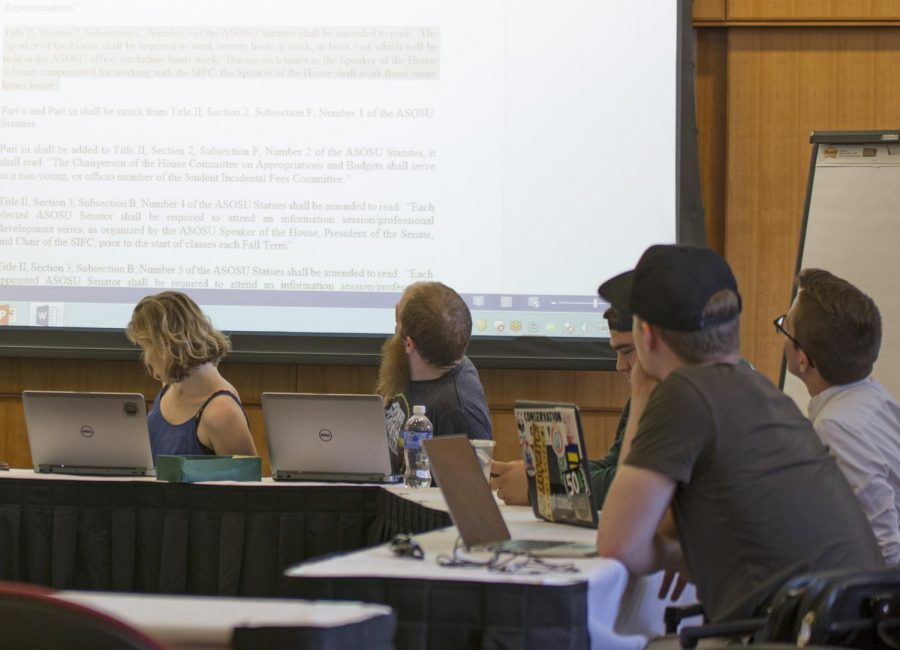ASOSU: Here we go again
May 25, 2016
Oregon State University students could have less say in where their student fees go.
Our own student government, the one that was elected and put into place to represent the entire student body, is back at it again, and a few of them appear to be shifting regulations within the student fee setting process to give themselves total power and control over where our money goes.
More specifically, the ASOSU House of Representatives and Speaker of the House could have more of a say in what happens with the Student and Incidental Fees Committee.
The latest bill in question is JB-07.23, co-authored by Corey Fisher, ASOSU graduate representative, and ASOSU Senator Joshua Kaufman.
To recap, Kaufman previously resigned as ASOSU’s executive director of finance following allegations of the misappropriation of funds during student body President Cassie Huber’s impeachment trial in the Fall.
It’s also important to note that he will also serve as Speaker of the House next year.
Oh, and it’s additionally important to note that he was one of the four senators who voted “yes” to JB-07.23 Tuesday night.
While many of us see our student government as a place in which nothing happens, the truth is that our student government does have a substantial amount of power and influence, especially over our student fees, and they are doing their best to misuse this power now.
This organization is supposed to represent the interests of the entire student body, not the interests of the student government itself.
We’ve said it before, and we’ll say it again.
The ASOSU Congress should not have the complete power to vote on, approve, stall or mediate their own budget. As we saw during winter term, the SIFC, which is tasked with the responsibility of hearing from campus groups funded through student fees and that recommends the final fee amount for approval by ASOSU Congress, had some obvious disagreements with the ASOSU when it came to final approval. SIFC and ASOSU went to mediation over ASOSU’s proposed budget (along with that of the Student Sustainability Initiative, in part due to the Night Owl, and the performing arts’ budget), and demanded that more money be given to the SafeRide program (currently part of the ASOSU budget as well).
The SIFC disagreed, and ASOSU ultimately agreed to approve the original SIFC recommended amount following discussions during mediation.
This was an ordeal. Trust us.
It was thanks to the current process of mediation that ASOSU was not ultimately successful in reducing funding to other programs in order to increase their own.
But some within ASOSU weren’t satisfied with these decisions, which is now why we likely see the entire process at risk of becoming corrupt.
As of now, SIFC exists under ASOSU, but has autonomy and stands on equal grounding when it comes to how much say they have. If ASOSU were to unjustly cut funding of another program or increase their own, SIFC would have the ability to go head-to-head against the changes in mediation rather than simply being overruled.
The fees committee and the ASOSU have a history of controversy, and this bill will do nothing but further perpetuate any conflict that exists.
JB-07.23 could essentially allow for ASOSU Congress to dictate their own funding, and take away funding from other organizations and groups on campus if they feel like they are not being given enough.
This is a conflict of interest. This is wrong.
This is ASOSU.
The vote to determine if the ability for the SIFC to take the ASOSU to mediation lies entirely within the ASOSU House of Representatives and the ASOSU Senate.
Let us rephrase that.
The organization that was upset that it could not take money from other organizations and not find “wiggle room” to give it to itself is voting on whether or not to skip other checks and balances entirely.
The Senate already passed the vote 4-2-0, and the House is likely to do the same.
The bill, if passed, would end up on President Huber’s desk (who is also a part of ASOSU leadership), which means one of two things could potentially happen:
Huber, whose term has been marred with controversy and an impeachment trial, will either go down as the ASOSU president that made the call to consider the broader voices of students on campus and vote this bill down, realizing that the way the process exists currently protects and pushes for the betterment of the student body as a whole.
Or, Huber will go down, for a lack of better words, as the student body president who pressed the metaphorical red button that flushed the student fee setting process down the toilet and gave future legislative branch officials—a group of people historically ridden with issues of conflict of interest and controversy—the power to decide where student money goes.
The ASOSU has operated this entire year (and beyond) with an utter disregard for the students they represent.
Unfortunately, “ASOSUseless” may be a sentiment of the past.
Now we are dealing with “ASOSUnderhanded” and perhaps even “ASOSUntrustworthy.”
This organization has continually failed us, and it’s time they step back and not only realize what they are doing is wrong, but acknowledge it.
Do not make a decision that could take the power of mediation away from the SIFC.
Vote this bill down.
And if the House passes the bill on through the legislative branch and it finds its way onto your desk, you must veto the bill, Ms. Huber.
We, as a student body, need to wake up.
We let this happen through years of apathy.
ASOSU knows that they can make these arbitrary rules because we continue to let them do so.
We are tired of talking about this.















































































































